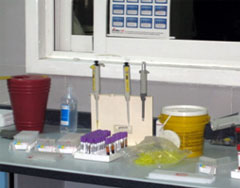Biosafety
 Photo credit: WHO
Photo credit: WHO
Biosafety is the safe working practices associated with handling of biological materials, particularly infectious agents. It addresses containment principles, technologies and practices that are implemented to prevent the unintentional exposure to pathogens and toxins, or their accidental release. Responsible laboratory practices, including protection, control and accountability for valuable biological materials will help prevent their unauthorized access, loss, theft, misuse, diversion or intentional release.
The World Health Organization (WHO) Regional Office for the Eastern Mediterranean provides technical support to Member States in developing biorisk management strategies to minimize risks of infections through safe and secure practices in laboratory and transport environments in a cost-effective manner. It provides guidance on, and promotes the use of, safe and secure workplace practices, appropriate protective equipment, and engineering and administrative controls in the handling of pathogenic organisms.
Information resources
Recent publications
Laboratory biosafety manual (third edition)
Biorisk management: Laboratory biosecurity guidance
Guidance on regulations for the Transport of Infectious Substances 2011–2012
A guide for shipping infectious substances
Links
Biosafety and laboratory biosecurity
Related topics
International Health Regulations
Related programmes
International Health Regulations
Surveillance and forecasting response
Blood safety, laboratory and imaging
Collaborating centres
Centers for Disease Control (CDC)
Office of Laboratory Security, Health Canada


